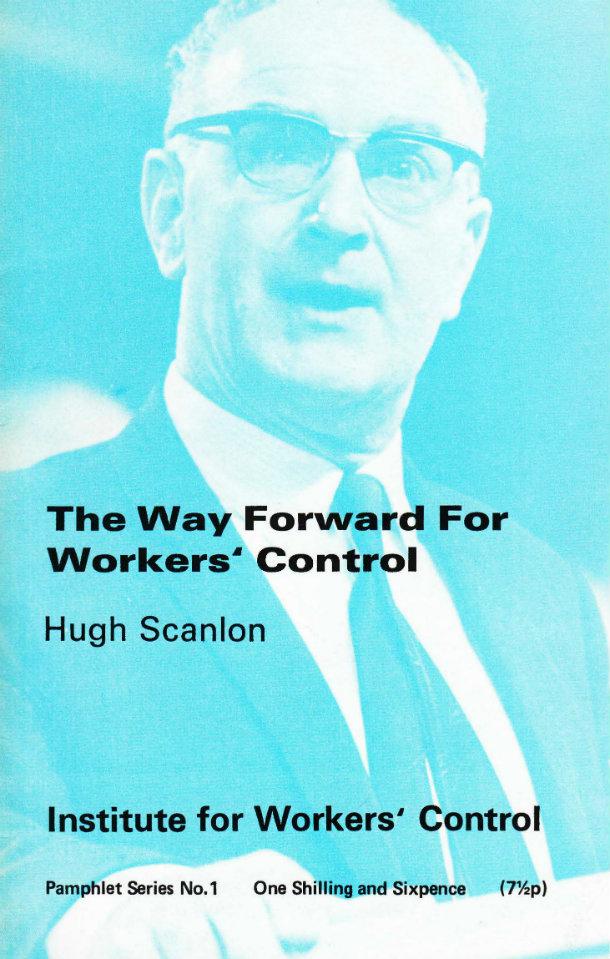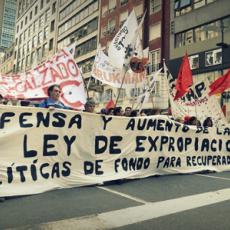The Way Forward to Workers' Control
This is the first in a series of pamphlets published by the Institute for Workers Control since the late 60s, arguing in favour of the workers assuming control of the british industry.
The whole question of workers' control is once again becoming an important issue in the British Labour Movement. In some ways, the situation today is analogous to that before the First World War. Expansion of Industry, coupled with inflation, in the years up to 1914, provided the basis for aggressive union action and the growth of ideas concerning workers' control, culminating in a historic pamphlet, the 'Miners Next Step'. It provided the impetus for the growth of the Shop Steward Movement, which arose during the war years itself.
The depression of the inter war years, with the resultant high unemployment, produced a largely defensive struggle by the labour movement, with the unions concentrating on the vital function of attempting 'to defend minimum national rates of pay. In these adverse conditions, the demands for workers' control over their environment and industrial destinies, died hard. The T.U.C. in the 1930's was formally converted to the Morrisonian concept of the running of nationalised industries, as exemplified in the London Passenger Transport Bill. This denied direct workers' representation, a view only arrived at after long and bitter debate. Modifications to Morrison's views had to be made in the 1930's due to the strength of the opposition from many trade unions which called for 'workers participation through their Trade Unions in the direction and management of nationalised industry at all levels.'
After the 2nd World War, 'the T.U.C. reverted to its earlier position 'by abandoning demands for direct representation except on consultative 'bodies, for nationalised industries. This was a position that the then Labour Government in office fully shared. It is significant that in these years, dissident voices were raised, including unions such as the Union of Post Office Workers and the N.U.R., who had full experience of the type of 'Joint Consultation' practised in the nationalised industries. The only unionists on the Board of nationalised industries, as laid down in policy agreed by the T.U.C., were those who had formally severed connection with their own
union. Direct representation by workers in management was completely excluded. The A.E.U. then, as now, rejected this approach. The A.E.U. spokesman at the 1948 Labour Party Conference stated that "we have always argued in the Socialist Party that brains are not a monopoly of any particular class. I certainly believe and am convinced that there are sufficient brains within the Trade Union and Socialist movement to warrant a greater proportion of seats on the governing bodies of nationalised industries". There was an increasing recognition that if it were merely a case of trade union appointment by government there was great doubt whether such a change would influence ordinary workers, since there was no more of a direct link with new nominees than with the present ones.
The debate was interrupted, for all effective purposes, by the return of a Tory Government in 1951. Current interest can now be said to have revived not only because of the return of a new Labour Government, but because of important changes in the Labour Movement which can be seen as a product of the boom period itself. The British Labour Movement has changed from the days of the thirties. Never has the labour movement in this country been stronger, more confident and more experienced largely as a result, not only of technological change, and the integration of white collar 'specialists' within the Labour Movement, but because of relatively full employment. Trade Union membership has doubled since the 1930's and the increased confidence of workers has reflected itself in the development of strong shop floor organisations, which have been able not only to bargain very effectively for increased earnings at a local level, but also question the 'prerogative of management'.
There already exists, particularly in fully unionised industrial concerns, a considerable degree of workers' control in individual factories if 'workers' control' is defined as effective control by organised workers over the arbitrary powers of management. This is indeed 'the seeds of the new society inside the old'. Shop Stewards prefer, and seem to get more out of, workshop bargaining than the type of 'consultation' favoured by management. 'Joint consultation' committees tend to be limited by the assumption that management should only agree to share responsibility on controversial and common interest issues, like manning, it cannot do more than consult'.[1] But workshop representatives see things very differently. Shop Stewards 'tend to believe that any subject which affects their members is a fit and proper matter for negotiations and agreement; they also are inclined to think that conflicts of interest can just as easily arise over questions such as the introduction of new machines or output levels as they can over wages and hours'.[2]
'This radical move away from the defensive mentality of the past is graphically shown in the facts concerning the causes of industrial disputes. It has been shown that between 1940 and 1960, the proportion of strikes, (excluding strikes in the mining industry) not directly concerned with wage increases but connected with disputes such as about working arrangements, rules and discipline have risen from about one-third to three-quarters of the total. In 1960, a T.U.C. survey showed that only 32 % of strikes were directly about money; 29% were about dismissals alone.
In this brief survey it is dear that the changes in the Labour Movement since the thirties is making nonsense of the concept of a purely 'economic man', limited to actions in defence of his standard of living. Far wider issues are involved today.
Yet even the extension of the current type of 'workers control' can be seen as holding only a watching and limiting function on the 'rights' of management. Workers are demanding an effective voice in management policy. This aspiration is particularly concentrated in regard to the nationalised industries, where obviously the greatest scope is offered for the demand that management 'be obliged to obtain the consent of workers in all matters of industrial policy. Trade unions envisage a radical extension of the scope of collective union action, from a point beyond wages and salaries to human conditions of employment in its broadest aspects.
It is in this light that union proposals on the structure of a nationalised steel industry, for example, are being based. The National Craftsmen's Co-ordinating Committee for the Iron and Steel Industry has submitted detailed proposals. Thus, at the Combine or group level it is proposed that the appointment of a head for the Operating Board should be subject to ratification by a Group Workers' Council. These Workers Councils, according to the N.C.C.C. proposal should 'be elected on a half and half basis from the appropriate trade unions and from shop, mill or office committees, and they should have the power to receive reports on all policies and to ask for detailed costing of all departments. At plant level, both the chairman and management representatives should be ratified by departmental committees or by the Workers Council, while ha1l the membership should be drawn from elected workers' representatives. At shop, mill and office level, the proposals are even more radical. Indeed they urge that democratically elected committees should subject to ratification the appointment of shop managers and foremen, the deployment of labour, promotion, the hiring and dismissing of workers, safety, welfare and disciplinary matters. They should also have special responsibilities for training and education, and other responsibilities delegated from the combine or group workers council.
The machinery suggested gives workers and unions both the powers of scrutiny and of veto, and so allows for the extension of workers influence on management beyond the limitations of defensive collective bargaining. Yet even on the most democratic system of workers' influence on management beyond the limitations of defensive such as the steel industry, serious problems must be faced. One problem is of course the perpetual dilemma of trade unions in discussing the question of work s' self-management, in that trade unions cannot easily double the part of protective agencies, democratically responsible to their members and required to carry out their membership's wishes, on the one hand, and joint policy makers and managers of industry; responsible to the public at large for efficiency and increased production, on the other.
But perhaps the most immediate problem so far as workers' control in the nationalised industries is concerned, is the position of these industries in a predominantly private enterprise economy. The evidence is overwhelming that nationalised industries in the pas t have been used primarily for the benefit of private industry. There is the problem of the run-down of some of these industries, such as coal. In the case of steel, the Benson Committee estimated that while the industry produced 27 million tons of steel in 1965 with 317,000 workers, in 1975 the estimated figures are 35.3 million tons with 215,000 workers. This one example underlines a fundamental dilemma; what is to happen to workers in a declining industry and how would the problem be approached and solved under workers' control?
So one is forced to take a wider view than that of workers' control in the present nationalised industries. It is questionable whether such control can ever be effective within a specific sector without the 'commanding heights' of the economy coming to public ownership. Indeed. without public ownership of the major sectors of industry, a rational basis for effective planning, which will allow a full system of workers' self-management and control, cannot be fully implemented. If the nationalised industries are dependent on the working of the Whole economy and if the economy is dominated its largest sectors, by private ownership, even the most democratic system of workers' control in an industry such as steel has built-in limitations.
So we are compelled to examine the prospects for workers' control in the major, private sectors, of the economy. Even in the most 'progressive' firms in the private sectors, 'workers participation' tends to run up against a brick-wall when it comes to the most vital aspects of company policy and managerial functions. Workers are held to have 'rights' to welfare, representation of grievances, and a share in those aspects of policy-making which do not challenge profit-making, While employers have 'rights' to dispose of their property, including the labour they hire, according to managerial policy. This conception gives rise to the 'separate spheres of interest' formulation which undermines all schemes for workers' participation and thus limits the scope of joint consultative bodies. There is still, in all essentials, the preservation of financial, technological and long term planning functions from any workers' veto.
Full consultation of this nature, though progressive, can only be a pale shadow of workers' full participation. Obviously trade unionists should support any method of consultation in private industry that limits the arbitrary decision-making of management and extends social accountability. But recent developments have sharply outlined that the power of management to unilaterally take decisions completely contrary to workers' needs and aspirations is in reality unchanged. The recent spate of big mergers and their methods of 'rationalisation' place the most elementary needs of jab-security in danger. The example of the A.E.I. closure at Woolwich shows the futility of a blind faith that these giant monopolies will acknowledge pressures for social accountability. Only full public ownership can give both workers and the general public control over these vast combines. Only through nationalisation of these giant monopolies can both effective planning on a national level, and an effective system of industrial democracy, to supplement the shell of political democracy (itself a product of the struggles of the working-class movement) be properly and effectively carried forward. The nationalisation of the basic industries under 'workers' control at all levels' is official A.E.F. policy. The Labour movement cannot rest contented with a tenuous and limited say merely in the functioning of welfare facilities. This is particularly true in the present industrial climate of larger and larger monopolies, only really accountable to their own shareholders, who may well become a threat to political democracy itself. In this connection the slogan of 'open the books' to allow accredited workers' representatives to pursue the financial ramifications of these vast combines is a concrete first step towards the development of social accountability.
One cannot give any kind of detailed blueprint for such a radical transformation as a transition to a socialist society under full democratic workers' self-management; what we can do is to analyse certain tendencies and safeguards that can be the basis of proposals to map our route without falling into the twin traps of .local. fr -for-al1s and excessive centralisation. Certainly with nationalisation, workers must not the made to feel, as they certainly do at present, that there is only a political change while there remains an industrial status quo. Fundamentally, the aim within public ownership is the wearing down of sides in industry, with no 'superiors' or 'inferiors' but only differences and functions based on knowledge and ability. Only through public ownership could there be this real will to cooperate.
There need be no real contradiction between the necessity for integration and centralisation of resource planning in a modern developed economy, and a structure of democratic decision-making that allows flexibility and the development of local initiative. It seems a false assumption to counterpose the two. Indeed the decentralised 'market' criteria of the Yugoslav pattern constrain the workers' freedom in work (irrespective of works-council decisions) and hamper the development of the economy. A caricature of a market economy cannot give workers effective decision-making powers over an economy. At the other extreme, a 'national plan' run purely by a small circle of bureaucrats at the top, as well as being unacceptable to the democratic aspirations of the British labour movement, is also economic nonsense in an advanced, highly complex industrial system. The consumer, although having no formal industrial rights, has a vital part to play in exercising controls over prices, quality and choice. Indeed the election of consumer committees at all stages of price and production determination would help to direct industry to the service of the community. The impetus that a nationalised, planned economy would provide to the expansion of consumer industries makes vital this type of full democratic participation in decision-making by both workers and consumers not only for the democratic, but in the economic interests, of the public.
A central planning medium needs the democratic participation of works committees and consumers, as well as specialist advice. Communication in industry in national, as well as plant planning, is a necessity. Ideas, aspirations and. intentions need to have full access and be encouraged upward, whilst explanations, snags and problems should move downward for discussion and .the creation of an informed working populace. The works committees, rising through industry to national planning, need the safeguards of all political democracy in order to discuss and decide upon alternatJ.ve plans for economic and structural development. Even where there is full workers' control in the industrial plants, workers will be discuss, and draw up the central plan itself, and have the opportunity to modify or change it in tune with changing circumstances or needs. Here the element of flexibility becomes all-important.
There must obviously be a recognition that specialists would play an important, and possibly more vital role under a structure of workers' self-management. Staff appointments, carrying such duties as design, experiment and research would remain with a high degree of autonomy in their research. Managers with over-all operative duties could work under the guidance and eventual control of representative bodies of workers, holding the power of appointment, promotion and dismissals. Every workshop or department could elect, by secret ballot, representatives to deal with managerial functions and in tum consult frequently with workers. Large factories might require interdepartmental committees, but for smaller plant, the next stage would probably 'be factory administration. Administration would embrace different functional divisions, com prising members of primary committees together with consumers. Administrative factory committees could 'be endowed with power to select managers who in turn would appoint supervisory grades, at least in the initial stages. Representatives from Factory Commit tees, elected to Industrial Councils could be enabled to work out policies relating to the whole industry, and provide a link with other industries and planning authorities. The necessity for control must be balanced by the freedom which enables individuals to apply their own ideas, while keeping in mind, and making allowances for, the wider needs of the community.
It has often been argued that a centralised planning medium of MUs character will 'inevitably' lead to a new ruling caste of managers and bureaucrats. This is obviously a point that needs to be carefully examined, in particular to see what safeguards, both organisationally and inherent in the structure of the society itself , would militate against this. Obviously the maintenance of political freedom to democratically discuss conflicting views of planning would be a powerful safeguard. But this by itself is not enough. The trade unions' role in a nationalised economy can also be an important factor in this direction. There is an essential need to preserve trade union independence. The unions must not 'be directly involved in controlling industry. The value of the unions will lie in their ability to take independent action to redress industrial grievances and act as a media for protection against injustice. Even in the content of a plan, there is scope for unions to act as bargaining agents and to play a role in determining wages.
Institutional checks can 'be introduced to halt any tendency towards an irresponsible bureaucracy. The right of recall of representatives by the membership and the interchangeability of positions would go a long way in this direction. However the main check to the growth of administrative autonomy by specialists would be provided by the benefits of a socialised economy itself. It has always been a basic socialist thesis that a planned economy would lay the basis for a tremendous increase in material resources, leaving room not only for a swift reduction in the working day (with the use of automation) but allowing, on the foundations of rapid economic growth, for a great extension in educational facilities. Obviously one cannot induce democratic involvement in industry by a stroke of the pen, but an effective participation needs a technologically educated work force. One cannot afford to examine the viability of workers' self-management in a static sense; technological advance could more than be equalled by cultural advance through the growth not only of administrative experience but of vastly improved educational resources. A reduction in the working day to allow time for study would greatly accelerate this process.
Workers already have the knowledge necessary to effectively increase this country's material resources. We have probably the most industrially experienced work-force in the world. But why should workers bring forward constructive ideas for the efficiency of a plant if it means their employers' gain and with the possibility of their work mates being made redundant as a result? Democratic self-management of industry by the workers themselves would release the long dammed up potential of the worker's hard-won experience. They would see that their creative ideas and suggestions would work, purely and simply for their benefit, and for the benefit of the community. This provides the basis for a new psychological attitude towards work, and thereby a raising of both cultural and material levels.
The British Labour Movement has the industrial and organisational experience of generations behind it. We can learn from the experience of other countries that have undergone a transition to the beginnings of a socialist society. And we can remember that as a highly advanced country, with such a strong working-class movement, such a transition can be accomplished more swiftly and easily in Britain. It can genuinely lead to the development of workers' control in industry and politics. We have the opportunity and the potential to make realisable the old socialist aspiration of a society geared, not to the exploitation of man by man, but simple administration by free men over the material abundance of the World.
Endnotes:
[1]. Cf. W. McCarthy, Evidence to the Royal Commission on Trade Unions.
[2]. Ibid.






Comments
Post new comment